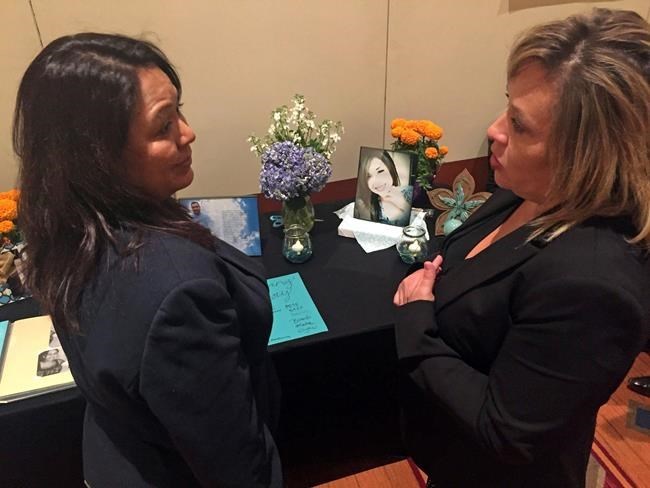
State Rep. Doreen Wonda Johnson, left, of Church Rock, N.M., pauses to console Paula Ortiz, of Chimayo, whose daughter, pictured on the table, died of a heroin overdose in 2016, Thursday, Nov. 2, 2017 in Santa Fe, N.M.. A Day of the Dead altar with family photos the departed stood in silent testimony to New Mexico's struggle to reduce the toll of opioid addiction, as state lawmakers and public health experts searched at a policy summit in Santa Fe, N.M., for new weapons against fatalities. (AP Photo/Morgan Lee)
Republished November 02, 2017 - 7:28 PM
Original Publication Date November 02, 2017 - 5:01 PM
SANTA FE, N.M. - A Day of the Dead altar with family photos of orphaned children in the arms of the departed stood as silent testimony to New Mexico's struggle to reduce the toll of opioid addiction, while state lawmakers and health care experts searched Thursday for new tools to combat deaths from the drug crisis gripping the nation.
The unique display at a summit attended by some 300 people in the most Hispanic state comes amid Dia de Los Muertos, a Mexican holiday remembering loved ones who have died.
The number of annual drug overdose deaths in New Mexico has plateaued amid a series of pioneering policies to combat opioid addiction, including becoming the first state to require law enforcement agencies to provide officers with overdose antidote kits.
Other solutions include a prescription monitoring database to prevent dangerous overlapping drug sales; increasingly expanding access to naloxone, a drug that can reverse overdoses; and allowing more medical providers to prescribe the opioid anti-craving drug bupenorphine.
Six states rushed to adopt many of those measures this year by declaring public health emergencies over opioid abuse ahead of the national emergency that President Donald Trump declared last week.
New Mexico epidemiologist Michael Landen on Thursday said he expects the state to fall to about 15th place in the rate of drug overdose deaths in 2016 from eighth place the prior year. Federal rankings are due out later this year.
He cautioned that New Mexico's ranking has improved only because the crisis is surging elsewhere. That left a committee of lawmakers grasping for new solutions at the summit in Santa Fe.
Against one wall, candles and orange marigold flowers decorated a makeshift altar. People wrote down the names of loved ones lost to addiction or propped up family photographs.
Lupe Salazar, 50, added a photo of a sister who overdosed on heroin, leaving her to care for two nieces, ages 4 and 10.
"There's this empty space now," she said. "No matter how many years go by, there is that void."
Lawmakers on a health care committee sought advice from a panel of experts in pain management, opioid antidote treatments and pharmacy practices on whether the state should adopt a seven-day limit on post-surgery opiate pain medication.
And they looked for scientific research on the use of medical marijuana to ease withdrawal symptoms. Republican Gov. Susana Martinez vetoed legislation this year that would have added "opioid use disorder" to the list of eligible conditions for medical marijuana.
Joanna Katzman, executive medical director at the University of New Mexico Pain Center, said it's not clear if limiting post-surgery opioid prescriptions can reduce overdose deaths, though several states have made that change.
State Sen. Liz Stefanics, a Santa Fe Democrat, suggested the widest possible distribution of antidote medication.
"I'm interested in legislation that would make Narcan available just like contraceptives in the state," Stefanics, referring to a brand-name antidote.
State Rep. Deborah Armstrong helped organize the gathering and hopes it will expand successful approaches to combatting the opioid crisis, especially if more federal funding becomes available.
Trump's commission on the opioid crisis called Wednesday for more drug courts, more training for doctors and penalties for insurers that won't cover addiction treatment.
News from © The Associated Press, 2017